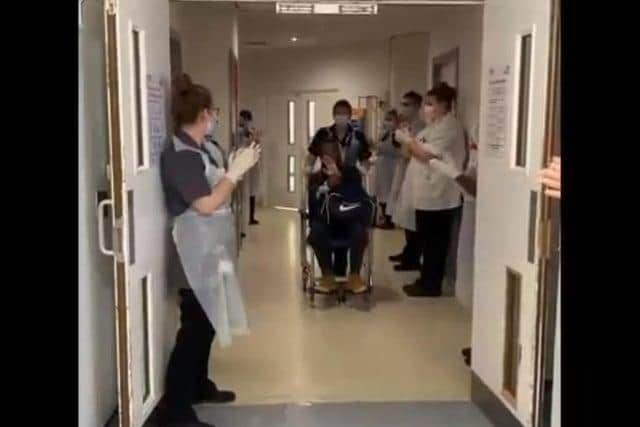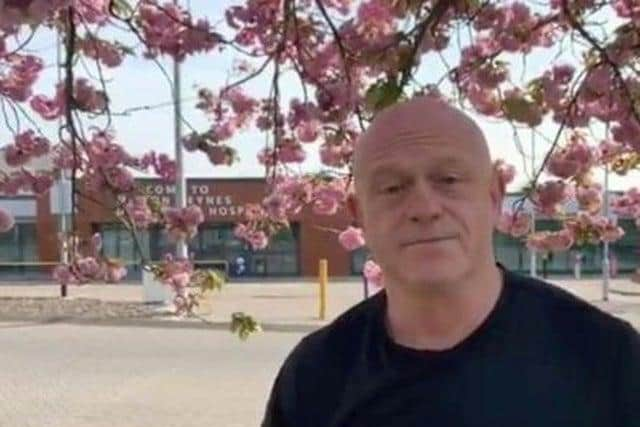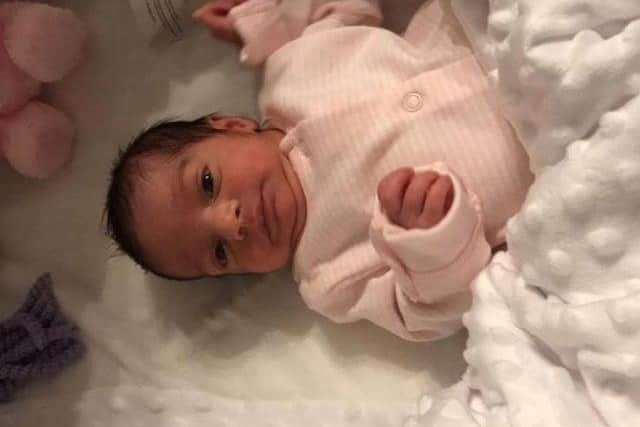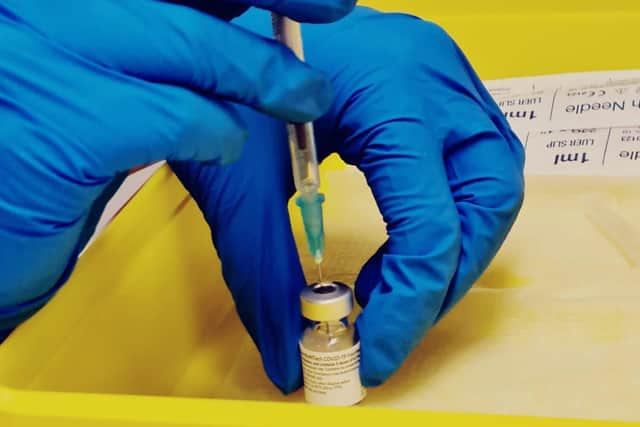A year like no other when the streets and shops of Milton Keynes fell silent as lockdown first began
and live on Freeview channel 276
The first sign of looming lockdown in March last was hordes of shoppers in MK buying up toilet rolls, soaps and hand sanitisers like their lives depended upon it.
Supermarket shelves were stripped of pasta, rice and tinned goods, and even flour suddenly became an impossible luxury to find.
Advertisement
Advertisement
The more unscrupulous shoppers were selling toilet rolls for huge profits on eBay, and the MK Citizen reported on one shameless seller from Milton Keynes touting six different multi packs of toilet rolls for a whopping £30 for a nine roll pack - plus £3.99 postage to boot.


Within days, loo rolls, sanitisers and food staples were rationed in supermarkets, while a demand for delivery services reached an all time high.
By April the daily death toll and Covid case counts were rising, but, with Covid tests still not available to the wider public, these were not an accurate depiction of how widespread the problem was.
For every one person that tested positive in MK, dozens more suffered symptoms. But they had no way of knowing if they had the virus or if it was indeed a cold or bout of flu. Our new regional 'lighthouse lab' testing centre opened on an industrial estate at Tilbrook in mid April but still tests were not readily available to Joe Public at home.
Advertisement
Advertisement
Estates and towns all over MK busied themselves forming support groups to ensure nobody shielding or self-isolating went without vital supplies, while the essence of this community spirit came to a noisy head on Thursday evenings, when people took to their doorsteps to clap, cheer and clatter saucepans for our NHS heroes.


Meanwhile, home schooling became the norm and words and phrases such as 'furlough', 'social distancing' 'PPE' and 'non essential shops' became part of the common vocabulary for the first time.
On April 16, former Eastenders actor Ross Kemp made a special visit to MK Hospital to film an ITV documentary. His visit prompted concerns from some members of the public who questioned why media were granted access at a time when relatives were forbidden to visit their loved ones who were dying.
More than 2,000 protesters signed a petition to get the documentary axed, and the hospital trust’s chief executive Joe Harrison even received a death threat.
Advertisement
Advertisement
The show was screened regardless on April 30 - and it got rave reviews after an emotional Ross Kemp told viewers: "All I can say is the care that patients are receiving here is second to none. It's the professionalism that's being displayed, the organisation... But most importantly it's the love. People are being treated with so much love...They really care about the people they are looking after here. And this is the most overwhelming thing."


'Ross Kemp: On the NHS Frontline' can still can be watched on catch up on ITV Hub.
By the end of April, a mass Covid testing centre had opened in a car park at Central Milton Keynes. This was followed by smaller testing facilities throughout MK.
May began with the first tentative easing of lockdown: people were allowed to sunbathe in MK's parks and public spaces and also leave the house to exercise more than once a day.
Advertisement
Advertisement
'Today is the sixth day without a Covid-19 death at Milton Keynes hospital', was the Citizen's truimphant headline on Sunday May 10.


MK Council chiefs announced they would shortly be launching a trial of e-scooters. The machines would be the perfect Covid-safe way to getting around the city during the pandemic, they said.
On May 28, the NHS Test and Trace system was officially launched across England with the help of 25,000 contact tracers. But the accompanying app would be delayed by several weeks.
By June 1, children began trickling back to school, year group by year group, and a couple of weeks later shops and places of worship re-opened. The following month pubs were allowed to open their doors again. But customers wondered how they'd get to enjoy their drink and a chat while wearing a facemask following the new mandatory ruling they should be worn in public spaces.
Advertisement
Advertisement
'No new coronavirus deaths in Milton Keynes for NINTH day in a row and no new cases for a week', shouted the Citizen's headline on June 5.
By the last week in June, the Prime Minister was timetabling out the further easing of restrictions, giving hope that life would return to a 'new normal'.
Milton Keynes had good summer, with new cases down to just a trickle and Covid deaths, at last, becoming few and far between.
On Saturday July 4, the Prime Minister announced that pubs, restaurants and hairdressers could re-open, provided they stuck to Covid-safe guidelines.
Advertisement
Advertisement
Two households could meet up in any setting with social distancing measures in place, and people could now enjoy 'staycations' in England with the reopening of accommodation sites.
Some leisure facilities and tourist attractions could also re-open. These included outdoor gyms and playgrounds, cinemas, museums, galleries, theme parks and arcades, as well as libraries, social clubs, places of worship and community centres.
The fun, albeit limited, continued as people enjoyed relative freedom. But towards the end of August, the number of new Covid cases began to creep up nationally.
On August 21 there were 1,033 positive tests throughout the UK and two Covid-linked deaths, bringing the total toll to 41,405.
Advertisement
Advertisement
Milton Keynes was also showing a slight increase in cases and our council leader Pete Marland warned it was 'highly likely' fresh lockdown restrictions would be imposed in the city if numbers continued to rise.
Neighbouring Northampton was placed onto 'area of intervention' list over its soaring infection rate. Compared to them, MK was fine - or so we thought.
Meanwhile business was booming at last for local restaurants and pubs as people took advantage of the Government's Eat Out To Help Out scheme, which gave diners up to 50 per cent off their bill.
During September the Citizen's headlines announced 'three more cases' 'four more cases' 'five more cases.... The rise was slow, but it was definite.
Advertisement
Advertisement
On September 8 Mr Hancock warned of a possible second peak following a “concerning” rise in the number of cases. Three days later the R value of coronavirus transmission rose above 1 in the UK for the first time for since the beginning of March.
It had been six months since the first lockdown was launched. People started to dread another one might have to follow.
From September 24 pubs, bars and restaurants all over MK and elsewhere had to stick to a 10pm curfew.
In October the new tier restrictions were launched for many in MK, the mood was complacent as we were placed firmly in the lowest band - medium risk.
Advertisement
Advertisement
The city could scarcely believe its luck at having seemingly escaped the worst of the second wave, and we wondered whether the lack of overcrowding and plethora of green open spaces had possibly saved us. Certainly neighbouring towns were nowhere near as fortunate.
'One neighbouring town to Milton Keynes goes into Tier Two lockdown as another teeters on the brink, ' read the Citizen's headline on Thursday October 29.
We went on to describe how Luton was heading for full Tier Two 'high risk' alert, while Northampton was under government scrutiny due to a surge in cases. Bedford too was not faring well.
We spoke too soon. By the end of the month, the number of new Covid cases in MK was rising daily.
Advertisement
Advertisement
"Over the last week there has been a noticeable rise in cases in Milton Keynes, especially those over the age of 60," said MK Council leader Pete Marland on October 30.
"The growth in positive cases over the past few weeks is a cause for great concern. If this continues, then further restrictions in a higher alert level will be required."
He was right. Another national lockdown was launched the very next day.
November 2020 saw Lockdown 2. As a city we were resigned, and hoped a short, sharp clampdown now would mean we'd all be able to enjoy a Christmas with our families.
Advertisement
Advertisement
The only difference between this lockdown and the March lockdown was that children were allowed to go to school. But by now the Citizen was reporting daily on how many outbreaks of new cases they'd been at local schools and how many schools had closed entire year groups due to infections.
All the talk was of a new, faster-spreading variant that scientists had found to be responsible for the surge of cases in MK and certain other parts of the country.
In December 2020, as soon as Lockdown 2 was over, MK was slapped in Tier 2 - high risk - restrictions. This didn't affect many Christmas shoppers, who still flocked to intu and the centre:mk to spend, spend, spend.
On December 8 Milton Keynes Hospital hit the headlines when it became one of the first places in the country to give Covid vaccines. First to receive the jabs were a local couple in their 80s, Barbara and Arthur Simper. Health officials began preparing a massive programme of vaccinations for the entire city.
Advertisement
Advertisement
But, despite the ray of vaccine hope, local case numbers continued to rise.
The government announced on December 17 that Milton Keynes would be moved up into Tier 3 restrictions - the government's harshest 'very high risk' category - from Saturday December 19. But still the shops did not close and still people rushed to finish their Christmas shopping.
We'd been in Tier 3 for a matter of hours when it was suddenly announced that we would move up to Tier 4 the very next day. The new rules also meant all non-essential retail in Milton Keynes must close, as well as gyms and hairdressers
They also meant that for MK, along with a list of other areas in the country, the Christmas with our families we had been promised was cancelled. For many, it was a bitter blow.
Advertisement
Advertisement
Two days before Christmas, a tiny baby girl was delivered prematurely by doctors at MK Hospital. Her mum Shamshad was seriously ill with Covid, unconscious, and about to be put on a ventilator. Nobody knew if she would make it to ever meet her new baby.
It took eight weeks for her to be well enough to cuddle little Shifa. The Citizen reported the happy ending here.
January 2021 saw the Covid infection rate in Milton Keynes go from bad to worse. By the time the New Year dawned, MK had shot from having one of the lowest rates in England to being among the worst 10 per cent of the country's 315 local authorities.
Over the six days between December 23 and December 28 there were 1,570 new Covid cases, bringing the infection rate up to more than 866 cases per 100,000 of the population.
Advertisement
Advertisement
The hospital started to fill alarmingly, with 200 Covid patients at its peak. Tragically, the death toll rose further, with several patients a day losing their battle.
On January 4 - the day MK pupils were told they would not be returning to school, the city's total number of confirmed cases stood at 11,203 since the start of the pandemic and our death toll is 256.
The following day we went into the third national lockdown, but it took a while for this to have an effect on case numbers. Milton Keynes' case rate continued to soar, reaching 1,000 per 100,000 people one fateful weekend, while deaths continued at a rate of up to 50 a week - an average of seven people a day.
MK Council launched a rapid testing facility at the Central Milton Keynes Library, aimed specifically at asymptomatic keyworkers at first.
Advertisement
Advertisement
An engaged couple their 30s both contracted Covid and shared the same ambulance to MK Hospital. The groom-to-be was so critically ill that nurses arranged for them to be married on the ward before he was put on a ventilator to fight for his life.
Meanwhile the city's vaccination programme was gaining speed, with GP surgeries joining forces to form seven special vaccination hubs throughout the borough.
'Between 2,000 and 3,000 people a day are now receiving Covid jabs in Milton Keynes' was the Citizen headline on January 10.
Doctors confidently predicted that every resident and staff member in every care home in Milton Keynes, along with 75 per cent of MK's population of over 80s will have received their jabs by the end of January.
Advertisement
Advertisement
At last the spread of the virus seemed to be slowing. During February the number of new cases started to stabilise, then slowly reduced.
On February 8, the mass vaccination centre opened at the city's centre's Saxon Court. Its single aim is getting as many people as possible vaccinated as quickly as possible.
Milton Keynes residents aged 70 and over were among the first to be invited to book a jab at the new centre, which can carry out between 2,000 and 3,000 jabs a day.
Today our case rate is down to 61.2 cases per 100,000 people. This is still higher than the national case rate, which is 58.1 per 100,000 of the population.
Advertisement
Advertisement
Pupils all across MK have returned to school once again. They are taking two quick-result Covid tests each week to identify asymptomatic carriers.
And today MK Council announced that anyone can go to CMK library and collect up to 14 home testing kits for free to cut the infection rate further.
Sadly patients are still dying, but the rate has slowed. Since the start of the pandemic, there have been 461 Covid-linked deaths in the city and 19,462 confirmed cases. MK Hospital currently has 62 Covid patients with none of them needing a ventilator.
The best news is that MK is whizzing through its Covid vaccination lists, with a massive 95,400 jabs administered.
Advertisement
Advertisement
Everyone in their 70s - 18,430 people - have now received a jab and first doses have been given to 92.8 per cent of the 65-69 age group and 80.8 per cent of 60-64s in Milton Keynes.
The percentage drops to 41.8% for people between the age of 55-59 in the borough, while 28,500 people under 55 have had their first doses.
Latest figures show 3,485 people aged under 55 in MK have received their second doses and 5,970 above 55 have too. Currently it is the turn of the over 50s to make their appointment.
It has been a year like no other and we're not out of the woods yet.
Advertisement
Advertisement
The pandemic has brought out the very best and the very worst in society.
But community spirit shone through brighter than ever before.
We must now hope we never see a year like it again with eyes firmly fixed on calendars and the tantalising prospect of true freedom and a return to normality from June 21st.